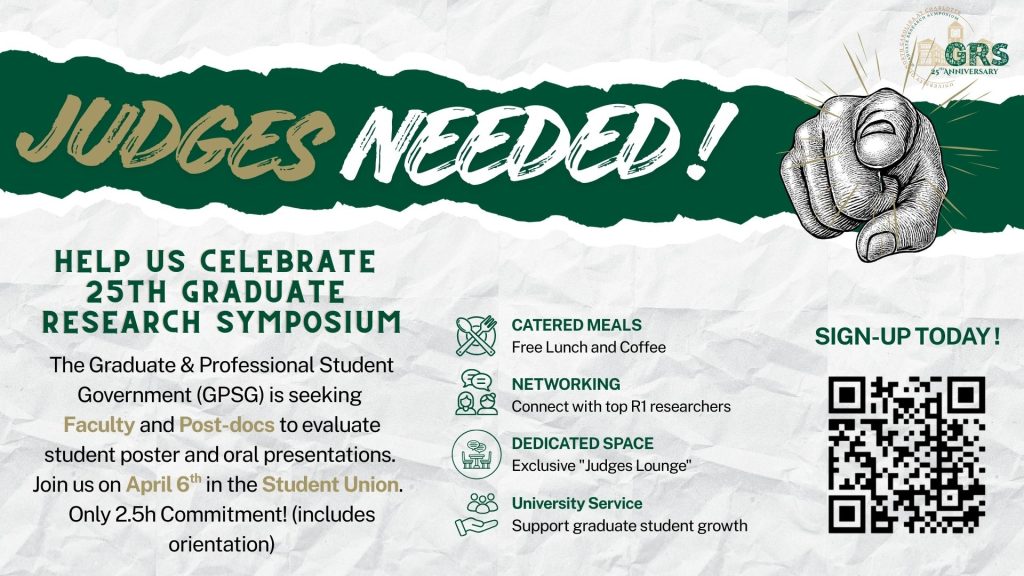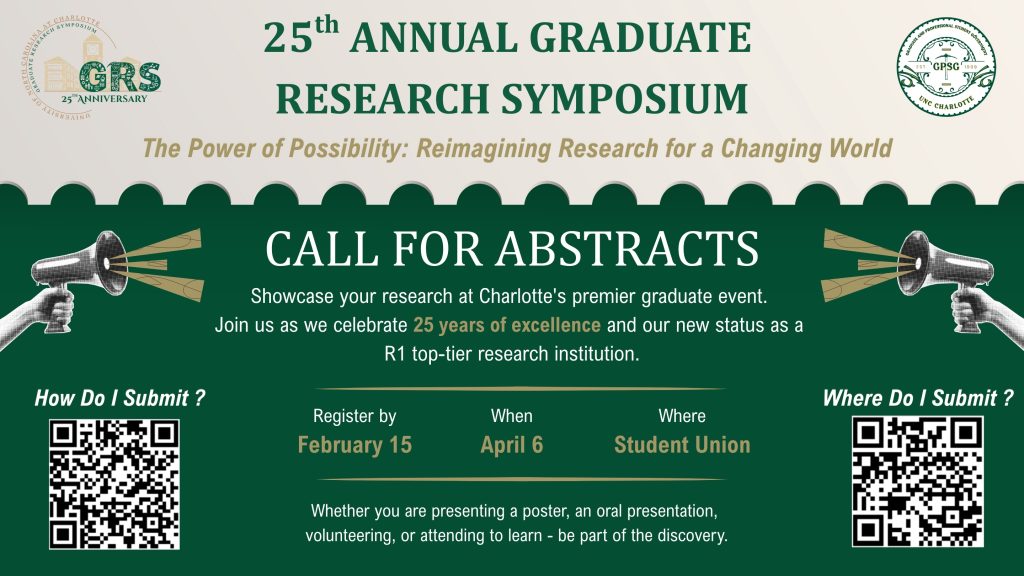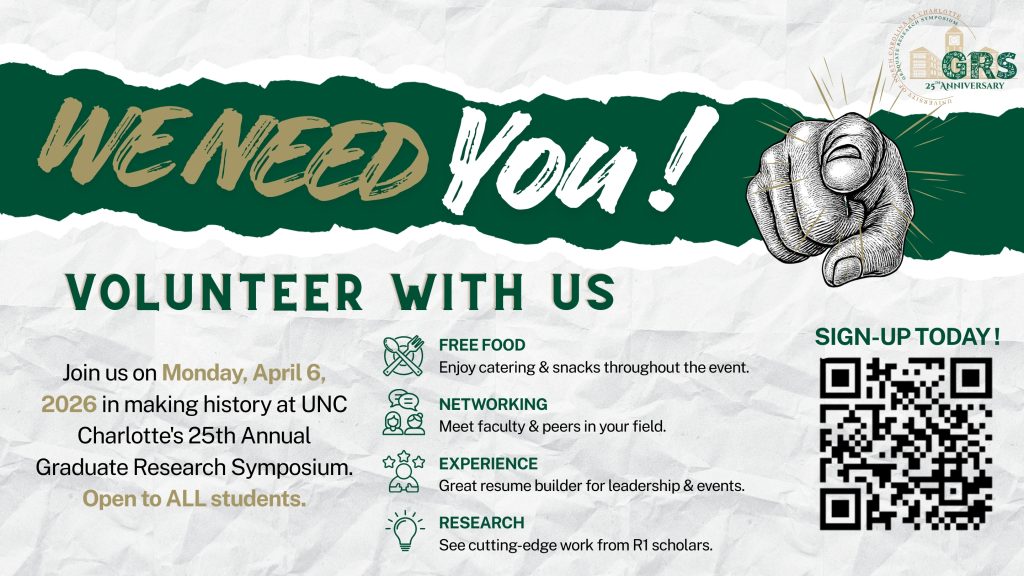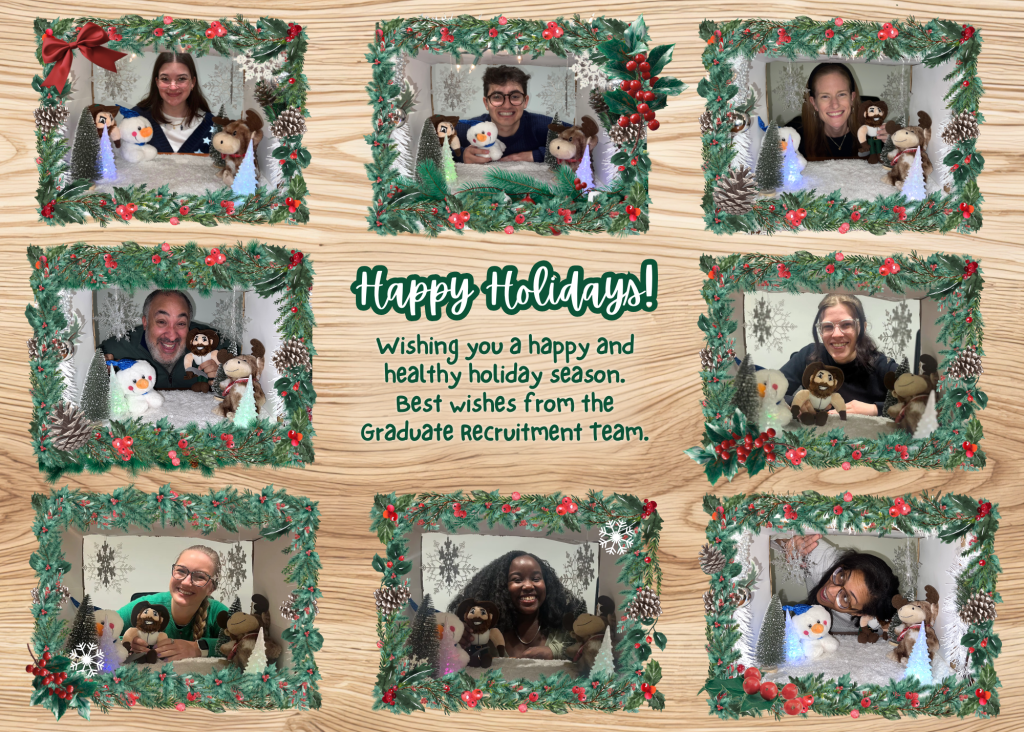Help us celebrate 25 years of excellence! The Graduate & Professional Student Government (GPSG) is seeking Faculty and Post-docs to serve as judges for the 2026 Graduate Research Symposium.

The Graduate Research Symposium (GRS) is an interdisciplinary, graduate-student-run event that showcases creative research by graduate and professional students from all programs. The theme for this year is “The Power of Possibility: Reimagining Research for a Changing World.”
For further details regarding GRS and volunteer opportunities, please refer to the flyers below.


As we close out the year, we are grateful for the partnerships that strengthen our shared recruitment efforts and uphold a collective commitment to excellence. Together, we advance access, quality, and outcomes for students through meaningful collaboration. From our team to yours, warm wishes for a restful holiday season and continued success in the year ahead.

The International Student & Scholar Office sends out monthly newsletters to international students and to visiting international scholars and their host departments. The newsletters provide reminders of immigration requirements, updates on ISSO sponsored events, and notices of any new or changing immigration policies that impact our students or scholars.
If you would like to stay informed of this information, you may subscribe to the ISSO monthly newsletters.
The Harshini V. de Silva Graduate Mentor Award committee is soliciting nominations for the 2026 award. This award was established in memory of Dr. Harshini de Silva, an associate professor of biology. She was noted for her deep dedication to the academic and professional development of graduate students.
Each year, the Chancellor’s Office and the Graduate School present this award to a full-time member of the graduate faculty who evinces these qualities of outstanding graduate mentoring. The recipient will be
honored at a ceremony held on the UNC Charlotte campus in the spring with an award of a crystal obelisk, a framed citation, and a cash prize.
All UNC Charlotte regular graduate faculty members are eligible to receive this recognition. Nominees should be distinguished, active scholars in their appropriate fields and should have a proven record of continuing interest in the growth and success of their students. Evidence of an outstanding graduate mentor should include activities that demonstrate an apparent dedication to providing graduate students with the skills and resources that they need to succeed as scholars and a sincere and active interest in the well-being of their students. These efforts should be related to professional appointments and accomplishments of former students as scholars. Although graduate students, past or present, staff, and faculty members of the University may recommend graduate faculty members for this award, nominations should come from chairs of academic departments. If the nominee is a department chair, the nomination should be made by the college dean.
Nomination materials should include at least the following:
The deadline for nominations is Friday, November 14, 2025. Visit the Graduate School’s website to submit your online nomination form.
Link to nomination form: https://forms.gle/PG233KJBdmtoi3Zj9
Link to webpage: https://sites.google.com/uncc.edu/gs-award-gateway/home/harshini-v-de-silva-graduate-mentor-award
Please contact Christi Skerlak at cskerlak@charlotte.edu with any questions.
Thank you in advance for taking the time to honor deserving candidates.
We are excited to share that we’ve published the first edition of our Graduate Recruitment Newsletter! This monthly newsletter is designed to be your go-to resource for everything recruitment-related — updates on enrollment, upcoming events, professional development opportunities, and tools to help your programs thrive.
Eligibility
Instructions for Nominations: To be considered, applicants must have completed their master’s degree
requirements and thesis during the period between Fall 2023 through Summer 2025, inclusive. The
Graduate School will verify eligibility.
2026 Award Categories
▪ Life Sciences (1 award): This includes, for example, biology; botany; zoology; ecology; developmental
biology; molecular biology; genetics; genomics; nutrition; biochemistry; biophysics; microbiology;
pathology; pharmacology; physiology; cell biology; neurosciences; immunology; and related fields.
▪ Social Sciences, Business, and Education (1 award): This includes, for example, anthropology,
accountancy, business, communications, criminal justice, demography, economics, education, finance,
gender and sexual studies, geography, government, international relations, law, linguistics, management,
marketing, political science, psychology, public administration, public policy studies, sociology, social
work, urban studies, and research in closely related fields.
▪ Non-traditional Thesis/ Project Award (1 award): This category refers to both theses in any field that do not readily conform to the traditional model, such as those produced in MFA programs both for literature and the performing arts, as well as those that deviate from the typical disciplinary approaches. Furthermore, it also includes capstone/final research-oriented projects in non-thesis degree programs.
Evaluation Process
Each submission will be reviewed and evaluated on the basis of clarity of style and presentation, scholarship, research methodology, and contributions to the field or discipline.
Application Materials
▪ A synopsis of the thesis (500-word maximum) outlining its context within the broader field, as well as how the completed research contributes to the discipline, prepared by the nominee.
▪ An abbreviated resume or CV for the nominee (2 page maximum, prepared by the nominee);
▪ A web link to the thesis or an electronic copy submitted by email;
▪ A letter of support/endorsement from the major professor focused on the criteria by which the committee will evaluate the submitted theses. These consist of: clarity of style and presentation, scholarship, research methodology, and contributions to the field or discipline.
▪ The thesis was approved in partial fulfillment of requirements for the master’s degree and that the student completed the master’s degree within the past two academic years and/or summer sessions (Fall 2023 through Summer 2025).
Award: The winners will receive $500 and an engraved plaque.
Please Note: Materials must be compiled as a single PDF and named as follows: ThesisAward_Category_LastName_FirstName_Institution.pdf and emailed to jhgreen@charlotte.edu.
For more information, please contact jhgreen@charlotte.edu.
The winners will be submitted to the regional CSGS Master’s Thesis Award competition based on their
submission, where they are eligible to win an honorarium of $1,000 and an award plaque. The award
ceremony will take place at our annual meeting in Baton Rouge in 2026.
The Graduate Recruitment Office recently posted a position in Hire-a-Niner for a Graduate Admissions/Recruitment Student Temp worker to assist in recruitment and admissions efforts for the Graduate School.
Our student temp workers help with various recruitment initiatives, including calls to prospective students, information sessions, office hours, responding to inquiries, etc. This position will start in September, depending on student availability. We would prefer a student who has at least a year left in their program and availability to work 20 hours a week in person.
If there are any current students in your program who may be interested, we would appreciate it if you could share this opportunity with them. The posting will close on September 2nd. Please let us know if you have any questions.
**Current students will need to log in to Hire-A-Niner to access this link.
As we prepare for the Fall 2026 recruitment cycle, I’m pleased to share an overview of our international recruitment efforts and strategic initiatives designed to enhance global engagement, enrollment outcomes, and student success across campus.
This update highlights key activities underway, including targeted marketing campaigns, counselor engagement strategies, and collaborative outreach with campus partners and external organizations. It also provides insight into the evolving global landscape, including visa policy changes and shifting student expectations, which are shaping the future of international enrollment.
Our efforts are aligned with institutional priorities and present meaningful opportunities for cross-unit collaboration. From expanding regional pipelines and leveraging digital engagement tools to refining messaging around career outcomes, we are positioning UNC Charlotte to remain competitive and responsive in a rapidly changing international education environment.
I invite you to review the full update and welcome your feedback, questions, or interest in partnering on any of these initiatives.
IMPACTS: These shifts may force students to rely on private loans (with interest rates upwards of 16%) or self-financing, especially for higher-cost programs like the DNP in Nurse Anesthesia and the DBA in Business Administration, and may result in less access and opportunity for people to pursue and attain a graduate education.
3. Repayment and Forgiveness Overhaul 
IMPACTS: These changes may result in increased lifetime repayment costs.
4. Creates Accountability Measures for Institutions
IMPACTS: This change may require significant institutional effort to manage program costs based on expected earnings.
We’re excited to announce two significant updates to our graduate websites coming this month:
graduateschool.charlotte.edu Content Migration (June 18): This is a technical content transfer to a new platform. The website’s appearance and navigation will remain exactly the same. We expect minimal disruption.gradadmissions.charlotte.edu Launch (June 23): Get ready for a fresh, modern look and an enhanced user experience on our graduate admissions site! This redesign will make it even easier for prospective graduate students to find the information they need.Stay tuned for more detailed announcements and dive into the new graduate admissions site on June 23!
The Graduate School is offering the new Lightcast Report Request Form to easily request customized Lightcast reports. Utilizing Lightcast’s labor market intelligence, these reports can provide valuable insights into your alumni’s career pathways, further education, estimated earnings, utilized skills, and more.
Access to the Lightcast form is available on GPDNet’s GPD News + Resources under Resources on the left side of the page.
For more information, please contact Josh Peterson (jpeter84@charlotte.edu).
The STEM Communication Training Program is recruiting faculty reviewers to rate work produced by graduate students in our program, supported by NSF Innovations in Graduate Education Award #2325453.
This training helps graduate students develop skills to communicate their research to general, non-specialist audiences. Assignments include op-eds, social media posts, videos, etc.
Reviewing will take place on May 27 and May 28. A $1,000 stipend will be provided as summer income.
If you’re interested, please contact Elise Demeter (edemeter@charlotte.edu) and indicate your availability for May 27 and May 28.
UNC Charlotte’s new website is launching June 1, including the newly reimagined academics hub at academics.charlotte.edu. Graduate program pages will be hosted on this site and you are likely a part of a review process for the initial information that will be displayed on June 1. Please connect with your College Communicator or ucomm-web-group@charlotte.edu if you have questions or need to provide updated information.
An update on graduate recruitment is now available from Graduate Admissions.
The report, published by Joe Campos, Assistant Director of Recruitment for the Graduate School, outlines current challenges, opportunities and strategies for enhancing international enrollment.
The report, Q1 2025 International Recruitment Update, is available for download.
The Spring 2025 Accelerate to Industry (A2i) professional development series concluded with the first-ever off-site workshop hosted at clinical device manufacturer Cefla North America’s headquarters in Charlotte.
Read more at the Graduate School.
Thanks to all who joined our recent workshops on graduate inquiry responses and enrollment trends. For those who couldn’t attend—or want to review—presentation slides are now available for both the Graduate Inquiry Response Project (NAGAP Partnership) and Enrollment Management Trends & AI presentations. Download here.
A week-long celebration of Charlotte’s graduate scholars kicks off Apr. 7 with wellness and art sessions, a talent show and plenty of food.
The week’s events culminate with the annual Graduate Research Symposium Apr. 11, an interdisciplinary graduate student-run conference that showcases the research of graduate and professional students.
More information on Graduate Student Appreciation Week is available from the Thomas L. Reynolds Center for Graduate Life and Learning. Information and application instructions for the Graduate Research Symposium is available from the Graduate & Professional Student Government.
The Graduate & Postdoctoral Writing Center (GPWC) invites applications for one new Doctoral Writing Fellow for AY 2025-2026.
Fellows are doctoral students who support the writing growth of Charlotte’s graduate students and postdoctoral scholars. This support includes one-on-one writing support sessions and other programming including presentations, events, and structured writing times. Focus for the search is on doctoral students with career goals related to science writing, grant writing, non-profit communication, and academic and educational publishing.
The GPWC Writing Fellow will receive a 20-hour weekly assistantship, the Graduate Assistant Support Program (GASP) which includes tuition and health insurance, stipend commensurate with the candidate’s doctoral program, and shared office space.
Applications will be accepted through Apr. 30. More information and application instructions is available from the Graduate & Postdoctoral Writing Center.
The student deadline for applying for a Graduate School Fellowship is Tuesday, Apr. 1. To apply, students may log in to the NinerScholars website and complete an applicant profile to be matched to available awards for which they are nominated.
More information on is available from the Graduate School Fellowship website.
Please contact Julie Green at jhgreen@charlotte.edu for questions.